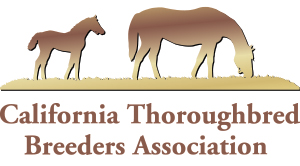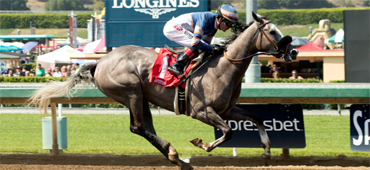By Paulick Report
ARCADIA, Calif. (June 16, 2016) — In talking with California breeder Nick Alexander, you’d never know that he’s an entirely self-made man. He comes across as humble, pragmatic, and occasionally even self-deprecating. His success, however, both in the business realm and the Thoroughbred industry, lends itself to a more impressive evaluation.
Thirty-five years ago, Alexander negotiated a bargain-bottom price on a car dealership that was nearly going under, quickly turning it into one of the largest automotive import businesses in Los Angeles. With his children at the helm of the company these days, the retired Alexander is able to focus on his passion: Thoroughbreds.
Alexander currently has one of the most talked-about California-breds on the West Coast racing scene – Enola Gray. In training with Phil D’Amato, the 3-year-old filly took nearly 10 months to get to the races, regularly sidelined by one issue or another.
“It got to where I stopped asking Phil how she was doing,” joked Alexander. Even on the day of her first race, Alexander had no idea how talented she would turn out to be.
“Phil isn’t the kind of guy who gets excited about much,” Alexander explained, noting that D’Amato neglected to mention just how good he thought Enola Gray was.
On April 10, Enola Gray broke her maiden at Santa Anita by 16 ¼ lengths, covering 6 ½ furlongs on the dirt in 1:13.71. She was never asked to run by jockey Tyler Baze and was moving so fast that she carried herself wide turning for home. Her final time was just a half-second off the track record.
“Wow is all I can say,” said Baze. “What an unbelievable filly.”
In her next start, Enola Gray successfully stretched her speed over two turns, winning the May 28 California-bred Melair Stakes by 2 ¼ lengths. While her stakes win was not as visually impressive as her maiden victory, Alexander discovered that the filly had ripped off her right front shoe at the start of the race — and still went on to victory.
Enola Gray isn’t just special because of her talent on the track, says Alexander. She’s a product of his own breeding program: he not only bred her on his farm, but also bred and raced her sire, Grazen.
“There’s nothing like it,” said Alexander of watching one of his homebreds cross the wire in front.
The late Mike Mitchell, for whom D’Amato was an assistant for many years, was Alexander’s original guide to the horse racing world. They worked together “on and off, but mostly on,” for several decades. In the beginning, it was just a few claimers, but Alexander quickly turned his focus to fillies and mares for a broodmare band. He wanted to breed Thoroughbreds to race in California so he could take advantage of the state’s incentive program.
“The biggest similarity between racing and the car business is that you have to be willing to take risks,” said Alexander. “I’ll admit that I’m not much of a businessman when it comes to the horses, though: I get very attached to them.”
One of those he grew attached to early on was the mare Hazen. In 2003, Alexander claimed her for $40,000 at the now-defunct Hollywood Park. Hazen, then a 5-year-old, had placed in several stakes and was well-bred. A daughter of Rubiano, the Eclipse Award-winning Champion Sprinter of 1992, she is out of a hard-knocking daughter of Kris S. who earned over $230,000 in her 56 career starts.
Hazen rewarded her new connections with four more winning efforts before she was claimed away. One race later, an injury ended Hazen’s racing career, and Alexander was able to purchase her back privately to join his growing broodmare band.
Proximity was the major determinant in Alexander’s choice of a stallion for Hazen. River Edge Farm, where stallion Benchmark (Alydar-Winter’s Love, by Danzig) stood, was just down the road. Hazen’s second foal by Benchmark, foaled in 2006, would become Alexander’s biggest breeding accomplishment to date.
Named Grazen, the colt showed early promise on the racetrack. A minor setback after his first start delayed the gray’s real coming-out party until his 3-year-old season, when he broke his maiden in a listed stakes race at Hollywood Park. A couple more wins, and Grazen became Alexander’s first graded stakes winner, taking the Gr. 3 Affirmed Handicap by 2 ¾ lengths over Misremembered.
Off as the heavy favorite in the 2009 California Cup Classic Handicap, Grazen had the lead at the top of the lane, but hit what Alexander called a “bad spot” on the Polytrack. Jockey Garrett Gomez pulled him up quickly and jumped off to cradle the horse’s leg in the air. The outlook was bleak. Grazen had torn through nearly 95 percent of the tendon in his front leg.
Always a calm, willing horse, Grazen was sent for surgery.
“I’ve never met a stallion as kind as Grazen,” said Alexander. “His attitude is the only thing that allowed him to survive that ordeal.”
Without a stallion barn on his own 280-acre spread in Santa Ynez, Alexander sent Grazen to Tommy Town Thoroughbreds for the 2010 breeding season, intending to breed just a few of his own mares to the horse. Grazen has proven to be a useful sire thus far, throwing stakes winners over multiple surfaces and distances. Alexander still brings the well-loved horse home to his own farm during the off-seasons to dote on him.
Unsung Herione (More Than Ready – Dove Shell, by Pleasant Tap), a mare Alexander purchased in the 2007 Keeneland November mixed sale for $40,000, was one of the first mares he bred to Grazen. She has now thrown four winners from four starters, though Enola Gray, her 2013 foal, is by far the best.
A baseball player through his formative years, Alexander named a large number of his runners for famous ball players. Enola Gray, however, represents a more patriotic icon: she is named for the Enola Gay, the plane that dropped the first atomic bomb on Hiroshima in 1945.
“That pilot’s actions were a moment of such courage and patriotism,” Alexander said. “He was doing something that had never been done before, and in the end, it saved a countless number of lives. I think people should remember that.”
Though he bestowed her with such an honorable name, Alexander waited to name her until it was nearly time for her first start. As a foal, Enola Gray didn’t make his list of top prospects. Each year, he chooses the best half of his foal crop to nominate to the Breeders’ Cup; the now lightning-fast filly wasn’t among them.
“It just goes to show you,” Alexander laughed. “I’ve been very lucky to have good horsemen like Phil and Mike to guide me.”


